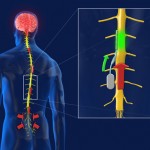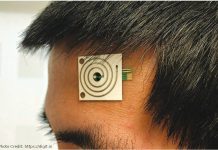 A smart chip that can block pain signals from traveling to the brain has developed by researchers from Sydney, Australia.
A smart chip that can block pain signals from traveling to the brain has developed by researchers from Sydney, Australia.
This smart chip was developed by biomedical, electrical and mechanical engineers at National ICT and is designed to be implanted in the spinal cord.
The idea is to dial down the effects of chronic pain and not to block all pain signals. The smart chip, smaller than the head of a match and embedded in a biocompatible device, can measure the properties of the nerves that carry pain signals to the brain and emit a 10 Volt electric pulse to block them. A couple of the devices are sewn into a 1.22mm wide micro-lead made from polymer yarn and electronic wires. The wires are then inserted into the spine (or elsewhere) and connected to a device containing a battery and a computer processor. The battery can be charged wirelessly.
The device could be used to treat chronic back pain, leg pain and pain from nerve damage, but could also help those suffering from migraines, Parkinson’s disease tremors or epileptic seizures.
NICTA wants to commercialize the technology in Sydney, planning to create a new spin-out company called Saluda Medical. The organization quoted research which said that chronic pain costs the Australian economy more than $34.3 billion a year and results in more than 36 million lost working days a year.



